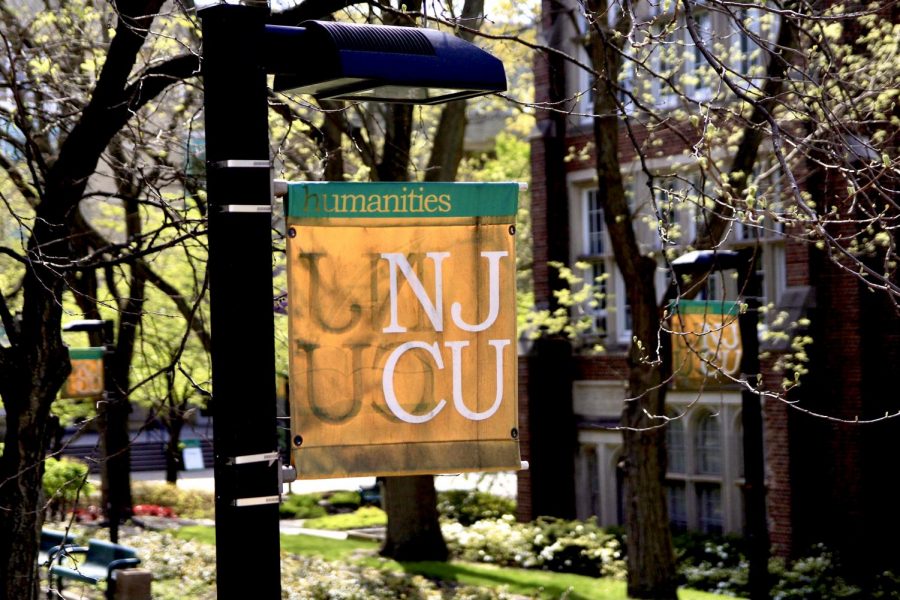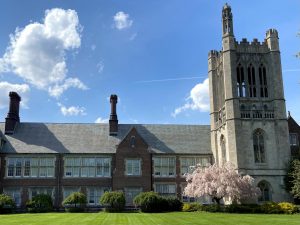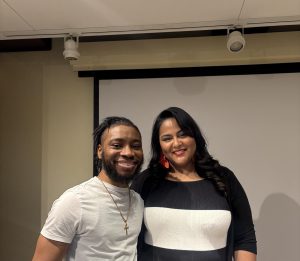Anxiety Looms Over NJCU Professors
Concerns About Impact From External Consultants
NJCU flag on campus.
April 29, 2021
Professors are anxious about the involvement of the rpk GROUP, fearing that academic programs and jobs could be cut. The rpk GROUP was hired to review the university’s academic “efficiencies” as well as administrative services.
During the Board of Trustees meeting on April 26, numerous professors spoke passionately to the administration and Board members about the methodology of the rpk research and how the group could omit important factors such as NJCU’s expansion projects and real estate ventures.

Many professors expressed that jobs and academic programs could be lost due to rpk’s history of proposing large cuts upon their consultation. Additionally, they worry that essential student services such as academic advisement, counseling, and even tutoring will face financial cuts due to the rpk analysis.
The university is in a multimillion deficit along with a decline in enrollment. Professors pleaded to the Board for the larger picture to be analyzed, not just the return on investment of academic programs as rpk has indicated they are focusing on.
Joel Katz, a Media Arts professor, spoke about NJCU’s financial situation. Citing information directly from the university’s website, he said, “When President Henderson assumed leadership of the university in 2013, the university’s net financial position was $108.8 million in the black. As of 2020, the most recent report, the university is $67.4 million in the red – a decline totaling $176.2 million.”
Katz noted that there are a variety of reasons that a decline as such has occurred including changes in the state contributions, student enrollment, and other factors. He said that the decline of nearly $175 million over seven years should cause alarm. With the rpk GROUP not looking into NJCU’s expansion projects (West Campus and Fort Monmouth), it would be unfair for any cuts to be made related to academic departments, faculty, or student support services.
Presenting the student perspective of NJCU’s expansion projects, Katz added, “Students ask why the University is building luxury apartments that they or their families cannot afford. At the same time, they see tuition increasing and essential services decreasing—services that are proven to improve graduation and retention. Luxury apartments do not improve graduation and retention rates, nor as planned do they show signs of an appropriate return on investment.”
Katz continued, “It looks like structural racism when NJCU seems to be aiding and abetting gentrification. This should be avoided not only for the optics it presents but on principle. Student success should always be our highest priority.”
William “Bill” Calathes, professor of Criminal Justice, executive member of the University Senate, and grievance chair for the American Federation of Teachers (AFT) Local 1839 union, was the first to speak about his concerns with the rpk involvement. Calathes questioned whether the work that rpk has been brought in to do could have simply been done “in-house.”
Pointing out the administrative salaries, he said “Perhaps large top salaries at NJCU may also be a contributing factor of our financial woes, not the salaries of an associate professor or a senior librarian. Perhaps the cost per administrative per student ratio here far exceeds that of comparative institutions like Montclair or Kean. Maybe that should be looked into.”
The Perspective of the Teacher’s Union
Professors share a common viewpoint on the impending results of the rpk report.
Calathes stated that the knowledge of rpk’s involvement at NJCU has resulted in a high level of anxiety throughout the campus. He expressed his own fears that the rpk report would diminish programs and potentially result in layoffs.
Speaking on the contract that the AFT 1839 union has with NJCU, Calathes said, “AFT Local 1839 is in contract with the administration, and this contract states that we are recognized by the administration as representatives who can bargain on behalf of workers. We have a right to demand that the university speak with us regarding any potential changes to the terms and conditions of workers’ employment.”
He continued, “I’m here to inform the board and everyone in attendance, that up to this point, the administration has denied the union any such participation. Specifically, Article Nine of our state agreement provides in relevant part ‘the union shall have the right to appoint one employee observer to each college-wide committee.’”
Calathes emphasized that rpk should be considered a college-wide committee per their objectives. He said, “We filed a grievance when the administration denied the observer, and hopefully, we will arrive at a just disposition of a step one hearing and if not, the Union will then move to arbitration in order to have a voice. Really, in this case, actually simply a set of eyes and ears in this process, eyes, and ears that are currently denied us.” Calathes requested the Board to advise the administration on including the union and the Senate in any decisions made.
Barbara Hildner, the president of AFT Local 1839 and an English professor, echoed many of the concerns brought up by Calathes. She noted that the grievance officer the union requested is only designated to observe, yet the university has denied their request.
Speaking from her experience and expertise with the liberal arts, Hildner claimed that rpk does not care about that field. Citing a 2016 study from The National Association of Colleges and Employers, she dispelled the stereotype that all liberal arts students come from financially better off backgrounds in pointing out that 33.8 percent of those students are first-generation in their families to go to college and receive a degree.
Hildner said, “Students who attend NJCU want to get that first job, a job unavailable to them without a college degree. A job that requires the excellent professional training NJCU provides, and I do not diminish its value to them into the University in terms of developing a wide breadth of programs and are attracting students. However, we’ve always wanted the breadth of their college education to support students’ movement to the fifth job and to enhance their full lives.”
Questioning rpk GROUP’s Research Methodology
Max Herman, a professor of Sociology, also spoke at the meeting about the absence of NJCU’s real estate ventures, the flawed approach of the rpk analysis, and the lack of involvement from students, faculty, and professional staff in any decisions that will be made.
Herman said, “I will preface my remarks by saying that I’m well aware of the university’s recent financial difficulties, but that the origins of those deficits are largely self-inflicted due to the incurrence of debt on real estate ventures that have yet to bring significant returns on investment. It is my belief and that of my colleagues that the university’s financial crisis will not be solved by cutting or consolidating academic programs.”
Speaking on how the money at NJCU could be better spent, Herman said, “Downsizing the university’s department offerings will merely encourage prospective students to go elsewhere to obtain the education that NJCU will no longer be providing. In terms of return on investment, the money spent on external consultants might be better spent on a marketing outreach program that promises to generate revenue rather than slashing academic expenses, rather than cutting the supply of educational programming; we should all be doing our best to increase student demand for our services.”
He continued, “As a professor who teaches a research methods course, I believe the methodology of the rpk study is severely limited and fundamentally flawed. It relies exclusively on existing quantitative data to evaluate the return on investment for academic programs such as concentrations, programs in which the majority of students enroll throughput, the ratio of students to full-time faculty, as well as faculty salaries. As the rpk consultants mentioned at the Town Hall meeting recently, they will not be looking at the quality of academic programs, nor do they plan to engage with students to examine why some of our students drop out or do not graduate in a timely manner. From a methodological as well as a practical standpoint, that’s highly problematic. Unless we address the obstacles that our students face on their path to obtaining an NJCU degree and effectively gauge the quality of our academic programs, we will not know how to allocate our resources in a maximally efficient manner.”
Joseph Moskowitz, a professor of Political Science, was the final professor to speak during the Board session. He gave new meaning to the letters in “rpk.” Moskowitz designated “r” for “report” in saying what the group is putting together is flawed for only including available data and omitting important information. Moskowitz let “p” stand for “pruning” where he explained that since the rpk GROUP is mainly analyzing the return on investment of individual programs, it would inevitably result in one of them getting cut. The final letter “k” stood for “knocked down” to indicate the way that NJCU faculty are feeling upon the revelation of rpk’s involvement and even after the AFT Local 1839’s grievance was rejected by the administration.
Moskowitz requested for the Board to consider a policy where they would promise to not downsize any programs or faculty groups for budgetary reasons until the end of 2024. He said, “If that happens, and people feel secure, I and others, and I’m convinced almost all of us, will stand up. We will invigorate this place more than we have already. We will work with you to sort out the best programs, the strongest programs, and the right enrollment. We will do that. But it’s hard to do that when you feel knocked down.”
Echoes of the Tuition and Fees Hearing
SGA President, Ricky Cruz, reiterated much of what he said at the Tuition and Fees Hearing held earlier the same day, crediting a 5.8 percent enrollment decrease in NJCU students to the increase in tuition during a pandemic. The tuition was increased by 3.5 percent in 2020.
Expressing his frustration in student voices not being heard by the administration, Cruz said, “Over the last about 10-11 weeks of the semester, the Student Government Association has requested to meet with the president on multiple occasions. We have asked for a meeting starting in February. We didn’t get a meeting until April.”
Cruz elaborated, “I fear that if we do not have transparency, we don’t have regular meetings, and if we’re not there when the conversations are being held, we cannot as an institution say that SGA is being effective or the institution is being effective in thinking about their students.”













